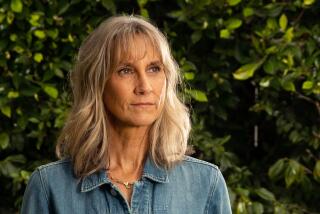PAGE TO SCREEN : Brutish and Short
- Share via
Although Alan Duff’s “Once Were Warriors” is set in New Zealand, most Americans will find it appallingly familiar. The subject is that country’s oppressed indigenous people, the Maoris, and how this oppression affects one family. The dad, Jake, is on the dole and beats his wife when he’s not drinking and brawling at the local pub. The mom, Beth, blots out the pain with beer and barely has a handle on her kids. The kids, principally Grace, Boogie and Nig, are in reform school, in a gang or literally at the end of a rope. It is a testimony to Duff’s storytelling skills that the reader sympathizes with these characters despite the unrelieved nastiness of their lives.
This nastiness was uppermost in director Lee Tamahori’s mind when he adapted “Once Were Warriors” for the big screen. “I wanted to stay true to the toughness of Alan’s book,” he says, “but I never wanted to shoot that book as a movie. We would never have people staying the distance.”
The choices Tamahori did make, however, have less to do with an audience’s tolerance level than they do with what he considers to be the book’s cliches and improbabilities. Chief among these is the harrowing scene in which Grace is raped. Because her father is such a drunken lout, she immediately assumes he is the rapist, although it is so dark that she--and the reader--can’t be sure.
“I didn’t believe a 14-year-old wouldn’t know her father’s raping her,” says Tamahori. So he substituted one of Jake’s drinking buddies, which is both plausible and preserves the author’s intentions.
Though there are many such scenes that Beth is not in, the story is told from her point of view--unlike the book, which has a stream of consciousness mode that skips from character to character. Tamahori and Duff differed on this approach, and after Duff had made several passes at the script, Tamahori replaced him with Riwia Brown.
“Even though he’d written the book,” says Tamahori, “he wasn’t the right person to write the screenplay. I wanted a woman to write it because we wanted it to be the wife’s story. I wanted dialogue the way women hear men say it when we all stand around in bars and BS. Men tend to write tough-guy dialogue, the stuff they’d like to hear themselves say, and I wanted a woman to throw that stuff back at us.”
Brown not only threw it back but also dealt with Tamahori’s other concerns. She beefed up the role of Boogie’s reform school officer and made him more sympathetic (“I always disliked the cliche of those parole officers who treat recently released prisoners with contempt,” says Tamahori) and eliminated the wealthy white neighbors whom Grace envies (“I found that trite, staring across the back fence at wealthy white affluence and longing for it”).
The result, says Tamahori, made Duff happy. Certainly he should be--it’s uncompromising, and it pushed the book back onto New Zealand’s bestseller list.
Sometimes directors make the best editors.
More to Read
Only good movies
Get the Indie Focus newsletter, Mark Olsen's weekly guide to the world of cinema.
You may occasionally receive promotional content from the Los Angeles Times.










